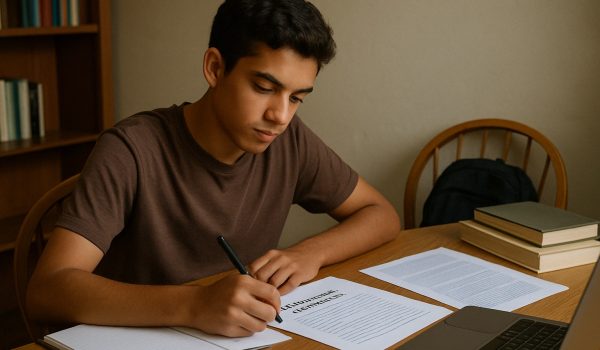For many young people, education offers a path forward. It is a chance to build a life beyond hardship, to gain skills, and to dream beyond borders. But for youth who are displaced—whether by war, occupation, or ongoing political instability—accessing education is filled with barriers. When daily life is shaped by uncertainty, the idea of applying for scholarships or attending university can feel out of reach. Yet, it is in these very circumstances that scholarships become lifelines.
Displaced youth often carry a strong desire to learn. They’ve experienced loss, disruption, and survival. Their ambition isn’t just personal—it’s rooted in a hope to contribute to their families and communities. Supporting their access to scholarships is not just about opening doors to education. It’s about recognizing their resilience and giving them the tools to thrive.
Education as a Form of Stability
When families are uprooted, so much is lost—homes, routines, and sometimes even a sense of identity. In these moments, education offers structure. For young people, returning to school or enrolling in a learning program helps restore a sense of normalcy. It gives them a space to think about the future, not just the present moment.
Scholarships play a key role in making this possible. Many displaced students live in host countries with limited access to public education. Even when schools are available, fees, transportation costs, and the need to work can keep students out of class. Scholarships remove some of these financial burdens and allow students to focus on learning. They also help restore dignity. Being chosen for a scholarship reminds students that their dreams matter and that someone believes in their potential.
In places like Palestine, where displacement has spanned generations, scholarships have been a vital resource. Whether in Gaza, the West Bank, or refugee camps in neighboring countries, educational opportunities give youth a way to shape their futures in spite of the conditions around them.
Barriers Faced by Displaced Youth
While scholarships exist, reaching them is another challenge. Many displaced students lack official documents like birth certificates, transcripts, or passports. This makes it harder to apply for programs, especially those requiring academic records or proof of residence. Language barriers and unfamiliar application processes can also make things harder.
Technology access is another issue. A student living in a camp without reliable internet may miss application deadlines simply because they couldn’t log in. Others might not know what scholarships are available, or how to write a personal statement that meets expectations.
Even when scholarships are awarded, other obstacles can appear. Some host countries limit the rights of refugees to study or work. Others impose fees or legal hurdles that make it hard for scholarship recipients to fully benefit from their awards. All of this makes one thing clear: financial support is necessary, but not enough on its own.
Community-Based Support Systems
Because of these challenges, community organizations often step in to fill the gaps. Local education centers, refugee support networks, and advocacy groups play a big role in helping displaced students access scholarships. They offer language support, document preparation, and help navigating application portals.
These programs also provide emotional encouragement. Many displaced youth have lost family members or carry heavy responsibilities. They may feel unsure about whether they belong in academic spaces. Having someone say, “You can do this,” makes a big difference. When students feel seen and supported, they are more likely to follow through.
In Palestine and across the diaspora, mentorship and peer support programs have emerged to help students build confidence and prepare for opportunities. Some are led by former scholarship recipients who return to give back. Their stories show what’s possible, and their guidance helps others move forward.
The Role of International Institutions
Universities around the world have recognized the importance of supporting displaced students. Some have created scholarship programs specifically for refugees and youth from conflict-affected areas. These programs often include more than tuition—they offer housing, counseling, and language training to help students succeed.
Still, more work needs to be done. Application processes must become more flexible. Requirements that exclude students without formal documents should be revised. Deadlines should allow for the realities of life in displacement, where access to resources may be unpredictable.
Partnerships between universities, NGOs, and community groups can strengthen outreach and follow-through. Scholarships are most successful when they are designed with input from those who understand the lived experiences of the students they serve.
A Ripple Effect
When one student receives a scholarship, the impact goes beyond the individual. Families benefit, communities gain skilled leaders, and future generations are inspired. Education creates ripples of hope, especially in places where opportunity has been scarce.
Scholarship recipients often return to serve their communities. Some become doctors, lawyers, teachers, or engineers. Others become advocates, using their voices to speak up for those who are still struggling. Their success is not just personal—it becomes part of a collective story of resilience.
Displaced youth bring with them lived knowledge, cultural strength, and creativity. Investing in their education means investing in a more just and connected world. It’s not charity—it’s a belief in potential, and a commitment to equity.
Moving Forward with Purpose
Making scholarships accessible to displaced youth is a shared responsibility. It requires universities to rethink systems, donors to fund programs, and communities to support students every step of the way. It also calls for patience and flexibility, because each student’s path is shaped by factors beyond their control.
But the reward is clear. When young people who have faced the hardest conditions succeed in education, they bring with them strength, compassion, and insight that enriches everyone around them.
For organizations working with displaced youth, the goal isn’t just access—it’s belonging. It’s not just about getting a scholarship—it’s about making sure students feel valued, supported, and equipped to grow. That’s the kind of investment that builds futures and strengthens communities for generations to come.

